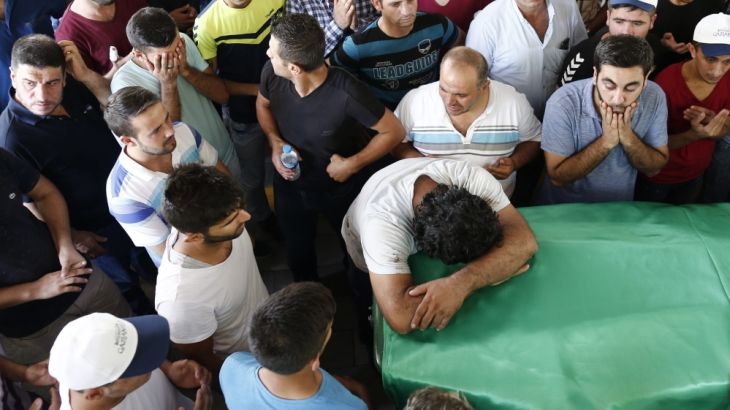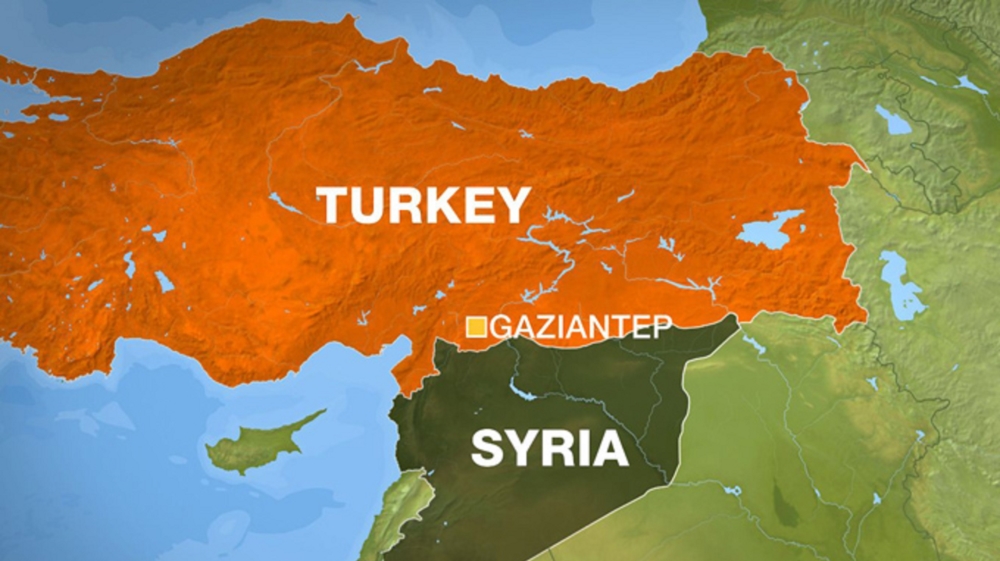Turkey: Suicide bomber kills more than 50 at wedding
Turkey’s Erdogan blames ISIL for attack in the Gaziantep province that has left at least 51 killed and scores wounded.

More than 50 people have been killed and scores more wounded in a suicide attack at a wedding ceremony in Turkey’s southeastern province of Gaziantep, near the Syria border.
Turkish President Recep Tayyip Erdogan said on Sunday that “Daesh is the likely perpetrator of the attack”, using the Arabic name for ISIL, also known as ISIS.
Keep reading
list of 4 itemsAslan, a little Syrian boy’s journey to hear again
Student, volunteer, shopowner: NW Syria’s Shaima defies limitations
World Food Programme to end general assistance in northwest Syria
The suicide bomber who attacked the wedding party was a child between the ages of 12 and 14, Erdogan said.
The president added that it is not yet clear whether the teenager detonated a suicide vest, or the vest was detonated remotely by someone else.
READ MORE: How will the military shake-up affect Turkey’s future?
“Turkish authorities are now going to look for further proof about the identity of the suicide bomber,” said Al Jazeera’s Hashem Ahelbarra, reporting from Gaziantep.
“They will try to find out whether this was someone used by adults, who strapped explosives around his body and remotely detonated the explosive.”
This is the first instance ISIL used a child in a suicide bombing attack in Turkey, Ahelbarra said.
In comments shown live by broadcaster NTV, Erdogan also confirmed that 51 people had died in the blast, and 69 were wounded. Seventeen of the injured were “heavily” wounded, Erdogan said.
“Our country and our nation have again only one message to those who attack us: You will not succeed!” he said.
![This is the first instance ISIL used a child in a suicide bombing attack in Turkey[Sedat Sunda/EPA]](/wp-content/uploads/2016/08/d20d71aeb66540fd97e960e6c7390e11_18.jpeg)
Hub for Syria refugees
The blast, which occurred at around 11pm local time on Saturday in the Akdere neighbourhood of Sahinbey district, was a “terror attack”, according to Ali Yerlikaya, the governor of Gaziantep.
A major city lying only 60km north of the Syrian border, Gaziantep has become a hub for Syrians fleeing the civil war in their country.
As well as refugees and opposition activists, there have long been fears it is home to a significant presence of sympathisers of the Islamic State of Iraq and the Levant (ISIL) group.
Separately, Samil Tayyar, a member of parliament from the governing Justice and Development Party, pointed the finger at ISIL in remarks on Twitter.
READ MORE: Turkey roundtable – War on two fronts?
Strong Kurdish presence
Sahinbey district is said to have a large number of Kurdish residents and reports indicate that the wedding, too, had a strong Kurdish presence, raising speculation of ISIL involvement.
The pro-Kurdish Peoples’ Democratic Party (HDP) said the wedding party was for one of its members. The groom was among those injured, but the bride was not hurt.
According to a report by Turkey’s Dogan news agency, the couple had moved to Gaziantep from another predominantly Kurdish town, Siirt, to escape from fighting between Kurdish rebels and Turkish security forces.
![The bomb went off as guests spilled out into the streets of the city after the traditional henna night party [EPA]](/wp-content/uploads/2016/08/e2f984c7b7cb48258eca08f1154f35a1_18.jpeg)
The bomb went off as guests spilled out into the streets of the city close to the Syrian border after the traditional henna night party, when guests have their hands and feet painted.
Women and children, including a three-month-old baby, were among the dead, witnesses said.
“The celebrations were coming to an end and there was a big explosion among people dancing,” said 25-year-old Veli Can. “There was blood and body parts everywhere.”
“We want to end these massacres,” witness Ibrahim Ozdemir told Reuters news agency. “We are in pain, especially the women and children.”
Purely civilian celebration
Metin Gurcan, a former Turkish military officer and columnist, told Al Jazeera the attack deliberately targeted HDP sympathisers attending a purely civilian celebration.
“This is the first of its kind in Turkey. And we know very well from the Afghanistan experience to what extent attacks on weddings can disrupt order in a society,” he said.
“I think ISIL is trying to exacerbate already tense ethnic and sectarian cleavages in the southeast of Turkey.”
 |
Southeastern Turkey has been hit by several deadly blasts over the past year, linked either to ISIL or the Kurdistan Workers’ Party (PKK), an armed group outlawed in Turkey.
Three suspected ISIL suicide bombers killed 44 people at Istanbul’s main Ataturk Airport in July, the deadliest in a string of attacks in Turkey this year.
Almost 40 people were killed in a suicide bomb attack in Ankara in March that was claimed by a Kurdish separatist group.
Violence flared up in the largely Kurdish southeast in the past week, with bomb attacks leaving 10 people dead in separate attacks, mostly police and soldiers, in an escalation that officials blamed on the PKK.
Failed coup fallout
Saturday’s attack comes a month after a group of Turkish soldiers attempted to overthrow the government, commandeering tanks, helicopters and warplanes in an attempted coup that killed 240 people.
The government has accused followers of Fethullah Gulen, a US-based exiled Turkish religious leader, of being behind the plot, a charge rejected by the cleric.
Hakan Yavuz, a professor in the department of political science at the University of Utah, says Turkey is more vulnerable now because of the purge in security forces after the coup.
“The coup attempt destroyed the military institutions,” Yavuz told Al Jazeera.
“There is also a rapprochement between Russia, Iran and Turkey over their Syria policies. Ankara is much more moderate now in allowing Syrian President Bashar al-Assad to stay in government, at least during the transition period,” he said.
“ISIL poses a greater threat to Turkey as a result of this shift in the country’s foreign policy.”
|
|